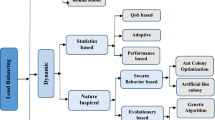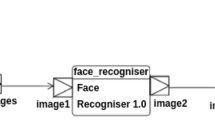Abstract
Energy consumption has become a key metric for evaluating how good an embedded system is, alongside more performance metrics like respecting operation deadlines and speed of execution. Schedulability improvement is no longer the only metric by which optimality is judged. In fact, energy efficiency is becoming a preferred choice with a fundamental objective to optimize the system’s lifetime. In this work, we propose an optimal energy efficient scheduling algorithm for aperiodic real-time jobs to reduce CPU energy consumption. Specifically, we apply the concept of real-time process scheduling to a dynamic voltage and frequency scaling (DVFS) technique. We address a variant of earliest deadline first (EDF) scheduling algorithm called energy saving-dynamic voltage and frequency scaling (ES-DVFS) algorithm that is suited to unpredictable future energy production and irregular job arrivals. We prove that ES-DVFS cannot attain a total value greater than C/000000, where 000000 is the minimum speed of any job and C is the available energy capacity. We also investigate the implications of having in advance, information about the largest job size and the minimum speed used for the competitive factor of ES-DVFS. We show that such advance knowledge makes possible the design of semi-on-line algorithm, ES-DVFS**, that achieved a constant competitive factor of 0.5 which is proved as an optimal competitive factor. The experimental study demonstrates that substantial energy savings and highest percentage of feasible job sets can be obtained through our solution that combines EDF and DVFS optimally under the given aperiodic jobs and energy models.
Similar content being viewed by others
References
H. Zeng, C. S. Ellis, A. R. Lebeck, A. Vahdat. ECOSystem: Managing energy as a first class operating system resource. In Proceedings of the 10th International Conference on Architectural Support for Programming Languages and Operating Systems, ACM, New York, USA, pp. 123–132, 2002.
M. Weiser, B. Welch, A. Demers, S. Shenker. Scheduling for reduced CPU Energy. In Proceedings of the 1st USENIX Conference on Operating Systems Design and Implementation, ACM, Berkeley, USA, 1994.
A. Borodin, R. El-Yavin. Online Computation and Competitive Analysis, Cambridge, UK: Cambridge University Press, 1998.
S. Baruah, G. Koren, D. Mao, B. Mishra, A. Raghunathan, L. Rosier, D. Shasha, F. Wang. On the competitiveness of on-line real-time task scheduling. In Proceedings of the 12th IEEE Real-time Systems Symposium, IEEE, San Antonio, USA, pp. 106–115, 1991.
S. K. Baruah, J. R. Haritsa. Scheduling for overload in realtime systems. IEEE Transactions on Computers, vol. 46, no. 9, pp. 1034–1039, 1997.
M. Spuri, G. Buttazzo. Scheduling aperiodic tasks in dynamic priority systems. Real-time Systems, vol. 10, no. 2, pp. 179–210, 1996.
C. L. Liu, J. W. Layland. Scheduling algorithms for multiprogramming in a hard-real-time environment. Journal of the ACM, vol. 20, no. 1, pp. 46–61, 1973.
J. Y. T. Leung, J. Whitehead. On the complexity of fixedpriority scheduling of periodic, real-time tasks. Performance Evaluation, vol. 2, no. 4, pp. 237–250, 1982.
M. L. Dertouzos. Control robotics: The procedural control of physical processes. In Proceedings of International Federation of Information Processing Congress, pp. 807–813, 1974.
H. Chetto, M. Chetto. Some results of the earliest deadline scheduling algorithm. IEEE Transactions on Software Engineering, vol. 15, no. 10, pp. 1261–1269, 1989.
H. Chetto, M. Silly, T. Bouchentouf. Dynamic scheduling of real-time tasks under precedence constraints. Real-time Systems, vol. 2, no. 3, pp. 181–194, 1990.
F. Yao, A. Demers, S. Shenker. A scheduling model for reduced CPU energy. In Proceedings of the 36th IEEE Annual Symposium on Foundations of Computer Science, IEEE, Milwaukee, USA, pp. 374–382, 1995.
I. Hong, M. Potkonjak, M. B. Srivastava. On-line scheduling of hard real-time tasks on variable voltage processor. In Proceedings of the 1998 IEEE/ACM International Conference on Computer-Aided Design, IEEE, San Jose, USA, pp. 653–656, 1998.
I. Hong, D. Kirovski, G. Qu, M. Potkonjak, M. Srivastava. Power optimization of variable voltage core-based systems. In Proceedings of IEEE Design Automation Conference, IEEE, San Francisco, USA, pp. 176–181, 1998.
Y. Shin, K. Choi. Power conscious fixed priority scheduling for hard real-time systems. In Proceedings of the 36th IEEE Design Automation Conference, IEEE, New Orleans, USA, pp. 134–139, 1999.
H. Aydin, R. Melhem, D. Mosse, P. Mejia-Alvarez. Determining optimal processor speeds for periodic real-time tasks with different power characteristics. In Proceedings of IEEE the 13th EuroMicro Conference on Real-Time Systems, IEEE, Delft, Netherlands, pp. 225–232, 2001.
R. Jejurikar, R. Gupta. Optimized slowdown in real-time task systems. In Proceedings of the 16th IEEE EuroMicro Conference on Real-time Systems, IEEE, Catania, Italy, pp. 155–164, 2004.
P. Pillai, K. G. Shin. Real-time dynamic voltage scaling for low-power embedded operating systems. In Proceedings of the 8th ACM Symposium on Operating Systems Principles, ACM, New York, USA, pp. 89–102, 2001.
H. Aydin, R. Melhem, D. Mosse, P. Mejia-Alvarez. Poweraware scheduling for periodic real-time tasks. IEEE Transactions on Computers, vol. 53, no. 5, pp. 584–600, 2004.
L. Thiele, S. Chakraborty, A. Maxiaguine. DVS for bufferconstrained architectures with predictable QoS-energy tradeoffs. In Proceedings of the 3rd IEEE/ACM/IFIP International Conference on Hardware/Software Codesign and System Synthesis, IEEE, Jersey City, USA, pp. 111–116, 2005.
N. Bansal, H. L. Chan, T. W. Lam, L. K. Lee. Scheduling for speed bounded processors. In Proceedings of the 35th International Colloquium on Automata, Languages and Programming, Part I, Springer, Reykjavik, Iceland, vol. 5125, pp. 409–420, 2008.
H. K. Chen, X. M. Zhu, H. Guo, J. H. Zhu, X. Qin, J. H. Wu. Towards energy-efficient scheduling for real-time tasks under uncertain cloud computing environment. Journal of Systems and Software, vol. 99, pp. 20–35, 2015.
H. E. L. Ghor, E. H. M. Aggoune. Energy saving EDF scheduling for wireless sensors on variable voltage processors. International Journal of Advanced Computer Science and Applications, vol. 5 no. 2, pp. 158–167, 2014.
J. W. S. W. Liu. Real-time Systems, NJ, USA: Prentice Hall, 2000.
V. Devadas, F. Li, H. Aydin. Competitive analysis of online real-time scheduling algorithms under hard energy constraint. Real-time Systems, vol. 46, no. 1, pp. 88–120, 2010.
Author information
Authors and Affiliations
Corresponding author
Additional information
Recommended by Associate Editor Jinhua She
Hussein El Ghor received the engineering degree from the Lebanese University, Lebanon in 2002. He also received the Ph.D. degree in automatics and applied informatics from the University of Nantes, France in 2012. He is currently a member of the Sensor Networks and Cellular Systems Research Center, University of Tabuk, Tabuk, Saudi Arabia. He authored many papers in prestigious journals and conferences. His research interests include real-time scheduling and partitioning with particular emphasis on energy efficiency and energy harvesting systems.
El-Hadi M. Aggoune received his M. Sc. and Ph.D. degrees in electrical engineering from the University of Washington, USA. He is a professional engineer registered in the State of Washington, and senior member of the Institute of the IEEE. He has taught graduate and undergraduate courses in electrical engineering at a number of universities in the US and abroad. He served at many academic ranks including endowed chair professor and vice president and provost. He was the winner of the Boeing Supplier Excellence Award. He was also the winner of the IEEE professor of the Year Award, UW Branch. He is listed as inventor in a major patent assigned to the Boeing Company. His research work is referred to in many patents including patents assigned to ABB, Switzerland and EPRI, USA. Currently he is a professor and director of the Sensor Networks and Cellular Systems Research Center, University of Tabuk, Tabuk, Saudi Arabia. He authored many papers in IEEE and other journals and conferences. He is serving on many technical committees. His research interests include modeling and simulation of large scale networks, sensors and sensor networks, scientific visualization, and control and energy systems.
Rights and permissions
About this article
Cite this article
El Ghor, H., Aggoune, EH.M. Energy efficient scheduler of aperiodic jobs for real-time embedded systems. Int. J. Autom. Comput. 17, 733–743 (2020). https://doi.org/10.1007/s11633-016-0993-3
Received:
Accepted:
Published:
Issue Date:
DOI: https://doi.org/10.1007/s11633-016-0993-3




